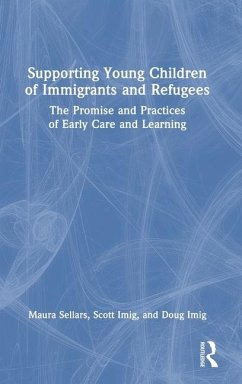This text offers a comprehensive portfolio of approaches to support young children with refugee backgrounds. It covers trauma-informed pedagogies, transitioning to school, authentic inclusion, play, social and emotional learning, and intergenerational trauma.
In early childhood centres around the world, teachers and directors can be uncertain of how to meet the needs of newly arrived children. Based on empirical research in five countries, this book offers insights from early childhood educators who are working hard to support families and young children with refugee and asylum-seeker experiences. It illustrates the link between theory and practice and the importance of developing culturally sensitive classroom strategies to effectively support the emotional and cognitive needs of multilingual, multicultural students whose common experiences may only include displacement, trauma, and loss. Rather than offering a measure for 'success,' this book shares the knowledge andexperience of practitioners who understand the work and the very particular circumstances of these children's lives. The authors bring these perspectives together in order to inspire other professionals who face this challenging work, encouraging the reader to reflect, to consider how relevant some of the ideas may be in their own contexts, and to contemplate the principles which allow their professional actions to make a difference.
This book is an essential resource for early childhood educators and leaders who want to 'open the door' to genuinely inclusive, empathetic, and supportive practice. It will be of great interest to researchers and postgraduate students in the fields of early childhood and primary education.
In early childhood centres around the world, teachers and directors can be uncertain of how to meet the needs of newly arrived children. Based on empirical research in five countries, this book offers insights from early childhood educators who are working hard to support families and young children with refugee and asylum-seeker experiences. It illustrates the link between theory and practice and the importance of developing culturally sensitive classroom strategies to effectively support the emotional and cognitive needs of multilingual, multicultural students whose common experiences may only include displacement, trauma, and loss. Rather than offering a measure for 'success,' this book shares the knowledge andexperience of practitioners who understand the work and the very particular circumstances of these children's lives. The authors bring these perspectives together in order to inspire other professionals who face this challenging work, encouraging the reader to reflect, to consider how relevant some of the ideas may be in their own contexts, and to contemplate the principles which allow their professional actions to make a difference.
This book is an essential resource for early childhood educators and leaders who want to 'open the door' to genuinely inclusive, empathetic, and supportive practice. It will be of great interest to researchers and postgraduate students in the fields of early childhood and primary education.
"While reading, each chapter sparked a flame in my heart, stronger and stronger. As an Early Childhood Teacher, educating refugee children, I feel it's our responsibility to advocate for the rights of all Australian children and advocate for the Early Childhood Profession. The first five years of a child's life is so instrumental to development. Your book is not only highlighting this, but it's advocating for the important role Early Childhood Educators play and how there is a need for policy makers to make changes to better reflect critical needs to support our educators, children, families and communities."
Claire Robinson, University of Newcastle, Australia
"Supporting Young Children of Immigrants and Refugees, a scholarly work by multiple authors is a serious and important work about working with children in families with refugee experiences, now resettled into five different, English-speaking countries. The book focuses on the difficulties the children and their families encounter as they are settled in countries very different from their countries of origin. The chapter on 'Trauma' is both comprehensive and compelling as it includes both the initial and lasting effects of the trauma suffered by refugee children. The chapter on children's play also stands out because of the understanding and emphasis on the importance of children's play and the sensitive writing about play. This is an important contribution to knowledge, a useful work for caregivers and other staff at refugee camps and a readable, informative work for policy makers and the general public."
Joseph M.Hawes, Professor of History Emeritus, University of Memphis, USA
Claire Robinson, University of Newcastle, Australia
"Supporting Young Children of Immigrants and Refugees, a scholarly work by multiple authors is a serious and important work about working with children in families with refugee experiences, now resettled into five different, English-speaking countries. The book focuses on the difficulties the children and their families encounter as they are settled in countries very different from their countries of origin. The chapter on 'Trauma' is both comprehensive and compelling as it includes both the initial and lasting effects of the trauma suffered by refugee children. The chapter on children's play also stands out because of the understanding and emphasis on the importance of children's play and the sensitive writing about play. This is an important contribution to knowledge, a useful work for caregivers and other staff at refugee camps and a readable, informative work for policy makers and the general public."
Joseph M.Hawes, Professor of History Emeritus, University of Memphis, USA

